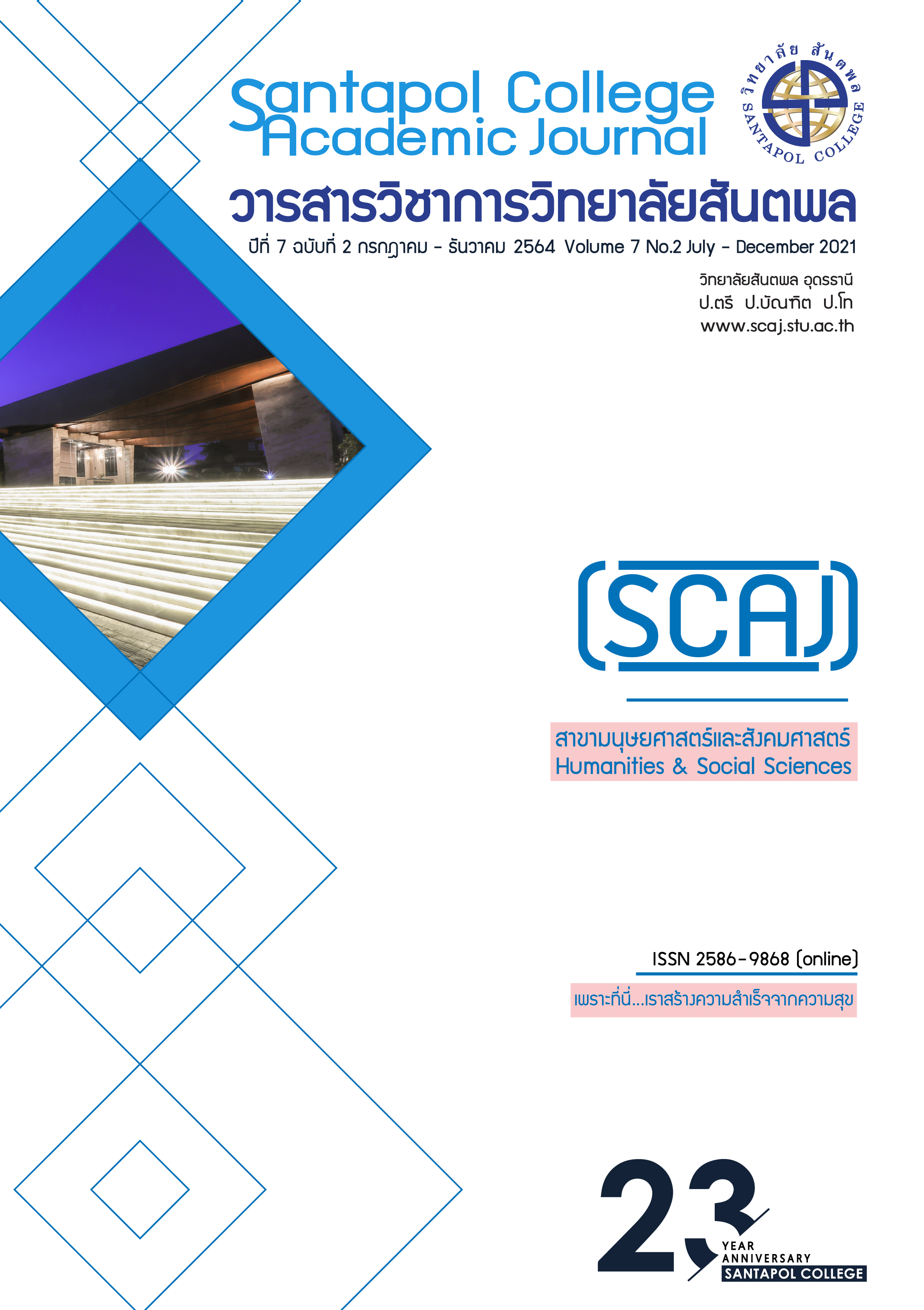คุณภาพการบริการเพื่อพัฒนาความพึงพอใจและการสื่อสารแบบปากต่อปากแบบอิเล็กทรอนิกส์ของนักศึกษาสถาบันระดับอุดมศึกษา จังหวัดขอนแก่น
Main Article Content
บทคัดย่อ
การวิจัยนี้มีวัตถุประสงค์เพื่อศึกษาความสัมพันธ์ระหว่างคุณภาพการบริการ ความพึงพอใจ และการสื่อสารแบบปากต่อปากแบบอิเล็กทรอนิกส์ของนักศึกษาในสถาบันการศึกษาระดับอุดมศึกษา ขอนแก่น ดำเนินการศึกษาโดยใช้แบบสอบถามในการเก็บรวบรวมข้อมูลจากกลุ่มตัวอย่าง คือ นักศึกษาระดับอุดมศึกษาที่ศึกษาในสถาบันในจังหวัดขอนแก่น จำนวน 400 คน แล้ววิเคราะห์ข้อมูลด้วยสถิติเชิงพรรณนาและสถิติเชิงอนุมานโดยการวิเคราะห์โมเดลสมการโครงสร้าง
ผลการศึกษาพบว่าคุณภาพการบริการมีอิทธิพลต่อการสื่อสารแบบปากต่อปากแบบอิเล็กทรอนิกส์ทางอ้อมโดยผ่านการสร้างความพึงพอใจ โมเดลสามารถอธิบายความสัมพันธ์กับการสื่อสารแบบปากต่อปากแบบอิเล็กทรอนิกส์ได้ร้อยละ 67 ผลที่ได้จากงานวิจัยเป็นแนวทางในการวางกลยุทธ์ทางการตลาดในการพัฒนาคุณภาพการบริการ นำไปสู่การสร้างความพึงพอใจ การถ่ายทอดความประทับใจและข้อมูลข่าวสารของสถาบันผ่านสื่ออิเล็กทรอนิกส์ของผู้บริโภคกลุ่มเป้าหมาย
Article Details

อนุญาตภายใต้เงื่อนไข Creative Commons Attribution-NonCommercial-NoDerivatives 4.0 International License.
เนื้อหาและข้อมูลในบทความที่ลงตีพิมพ์ในวารสารวิชาการวิทยาลัยสันตพล ถือว่าเป็นข้อคิดเห็นและความรับผิดชอบของผู้เขียนบทความโดยตรง ซึ่งกองบรรณาธิการวารสารไม่จำเป็นต้องเห็นด้วยหรือรับผิดชอบใดๆ
เอกสารอ้างอิง
นัทธมน นักพาณิชย์. (2560). การรับรู้คุณค่าด้านราคาและคุณภาพการบริการที่ส่งผลต่อความพึงพอใจและความภักดีต่อคลินิกเสริม ความงามด้านผิวพรรณของผู้ใช้บริการในกรุงเทพมหานคร. ปริญญาบริหารธุรกิจมหาบัณฑิต, สิงหาคม 2561, บัณฑิตวิทยาลัย มหาวิทยาลัยกรุงเทพ.
ศศิประภา เจริญทรัพย์. (2557). คุณภาพการบริการและการสื่อสารปากต่อปากที่ส่งผลต่อการประเมินคุณภาพการบริการร้านอาหารระดับพรีเมี่ยมของผู้บริโภคในเขตกรุงเทพมหานคร. การค้นคว้าอิสระ ปริญญาบริหารธุรกิจมหาบัณฑิต มหาวิทยาลัยกรุงเทพ.
สุณิสา ตรงจิตร. (2559). ปัจจัยที่มีอิทธิพลต่อการตัดสินใจซื้อสินค้าออนไลน์ผ่านช่องทางตลาดกลางพาณิชย์อิเล็กทรอนิกส์ (E-Marketplace). การค้นคว้าอิสระปริญญาบริหารธุรกิจมหาบัณฑิต คณะพาณิชยศาสตร์และการบัญชี มหาวิทยาลัยธรรมศาสตร์.
เสาวณีย์ คงเจริญพร และชลธิศ ดาราวงษ์ (2021). คุณภาพการบริการของบ้านเช่าที่มีอิทธิพลต่อความพึงพอใจและการบอกต่อของนักศึกษาในจังหวัดชลบุรี. วารสารวิชาการวิทยาลัยสันตพล, 7(1), 72-78.
Andreassen, T.W., and Streukens, S. (2009). Service innovation and electronic word-of-mouth: is it worth listening to?. Managing Service Quality, 19(3), 249-265.
Butt, M.M., and Aftab, M. (2013). Incorporating attitude towards Halal banking in an integrated service quality, satisfaction, trust and loyalty model in online Islamic banking context. International Journal of Bank Marketing, 31(1), 6-23.
Casidy, R. (2014). Linking Brand Orientation with Service Quality, Satisfaction, and Positive Word-of-Mouth: Evidence from the Higher Education Sector. Journal of Nonprofit & Public Sector Marketing, 26(2), 142-161.
Chaniotakis, I.E., and Lymperopoulos., C. (2009). Service quality effect on satisfaction and word of mouth in the health care industry. Managing Service Quality, 19(2), 229-242.
Collier, J.E., and Bienstock, C.C. (2006). Measuring Service Quality in E-Retailing. Journal of Service Research, 8(3), 260-275.
Hausman, A.V. (2003). Professional service relationships: a multi-context study of factors impacting satisfaction, re-patronization, and recommendations. Journal of Service Marketing, 17(3), 226-242.
Hong, S.-J., Choi, D., & Chae, J. (2020). Exploring different airport users’ service quality satisfaction between service providers and air travelers. Journal of Retailing and Consumer Services, 52, 101917.
Kalia, P. (2017). Service quality scales in online retail: methodological issues. International Journal of Operations & Production Management, 37(5), 630-663.
Kitapci, O., Akdogan, C., and Dortyol, I.T. (2014). The Impact of Service Quality Dimensions on Patient Satisfaction, Repurchase Intentions and Word-of-Mouth Communication in the Public Healthcare Industry. Procedia - Social and Behavioral Sciences, 148(2014), 161–169.
Kotler, P., & Keller, K.L. (2012). Marketing Management. 14th ed. England: Pearson Education.
Kotler, P.T., Bowen, J.T., & Makens, J. (2014). Marketing for Hospitality and Tourism. 6th ed. England: Pearson Education.
Kucharska, W. (2019). Online brand communities’ contribution to digital business models: Social drivers and mediators. Journal of Research in Interactive Marketing, 13(4), 437-463.
Lu, N., and Wu, H. (2016). Exploring the impact of word-of-mouth about Physicians’ service quality on patient choice based on online health communities. Medical Informatics and Decision Making, 16(151), 1-10.
Méndez, J., Leiva, F.M., and Fernández, J.S. (2015). The influence of e-word-of-mouth on travel decision-making: consumer profiles. Current Issues in Tourism, 18(11), 1001-1021.
Parasuraman, A., Zeithaml, V.A., and Berry, L.L. (1985). A conceptual model of service quality and its implications for future research. Journal of marketing, 49, 41- 50.
Pariseau, S.E., & McDaniel, J.R. (1997). Assessing service quality in schools of business. International Journal of Quality & Reliability Management, 14(3), 204 – 218.
Schiffman, L.G., & Kanuk, L.L. (2007). Consumer Behavior. 9th ed. USA: Pearson Prentice Hall.
Shabbir, S., Kaufmann, H.R., & Shehzad, M. (2010). Service quality, word of mouth and trust: Drivers to achieve patient satisfaction. Scientific Research and Essays, 5(17), 2457-2462.
Veasna, S. et al. (2013). The Impact of Destination Source Credibility on Destination Satisfaction: The Mediating Effects of Destination Attachment and Destination Image. Journal of Tourism Management. 36, 511-526.
Velázquez, B.M., Blasco, M.F., and Saura, I.G. (2015). ICT adoption in hotels and electronic word-of-mouth. Academia Revista Latinoamericana de Administración, 28(2), 227-250.
Wright, K.B. (2005). Researching Internet-Based Populations: Advantages and Disadvantages of Online Survey Research, Online Questionnaire Authoring Software Packages, and Web Survey Services. Journal of Computer-Mediated Communication, 10(3).
Zabkar, V., Brenc, M. M., & Dmitrovic, T. (2010). Modeling Perceived Quality, Visitor Satisfaction and Behavioural Intentions at the Destination Level. Tourism Management, 31(4), 537-546.
Zhang, Z. et al., (2010). The impact of e-word-of-mouth on the online popularity of restaurants: A comparison of consumer reviews and editor reviews. International Journal of Hospitality Management, 29(2010), 694–700.
Zoghlami, A. T., Ben Yahia, K., & Berraies, S. (2018). From Mobile Service Quality Evaluation to E-Word-Of-Mouth: What Makes the Users of Mobile Banking Applications Speak About the Bank?. International Journal of E-Services and Mobile Applications, 10(2), 36–57.


